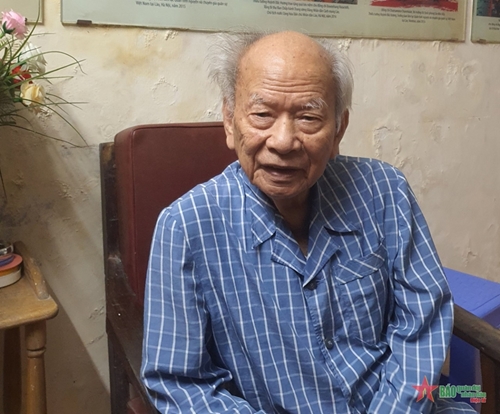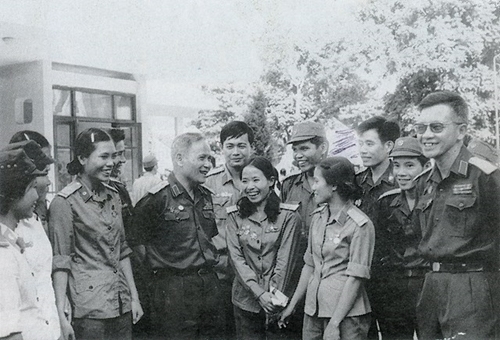I got to know Mr. Hai Manh, nickname of General Chu Huy Man (real name Chu Van Dieu) at the beginning of 1943 when I was imprisoned by the French colonialists in Quang Nam province. At this time, Man had just escaped from prison in Dak To and fled to Vinh Dien (Quang Nam) and worked as an assistant at the confectionery shop of Mrs. Duc Long, whose family was very sympathetic to the revolution. While selling candy on streets, he tried to contact the revolutionary movement and the Party's establishments operating in the locality.
    |
 |
|
Major General Huynh Dac Huong |
During the time, guards of Vinh Dien prison sent political prisoners to the Vinh Dien River to carry water to the provincial headquarters, so they met Man. We initially suspected that he was a Trostkyist (counter-revolutionist), but later knew that he was a revolutionary soldier who escaped from prison and was looking for contact with the Party. After knowing his identity, we reported to higher levels and further kept an eye on him. From information learnt, we were sure that he was a young man from Nghe An, who operated secretly as a candy seller. At the beginning of 1945, while Tran Van Que and Nguyen Giam were transferred from Buon Ma Thuot prison to Phu Bai (Hue), they boarded a ship back to the Quang Nam provincial Party Organization and set up a provisional provincial party committee. The provincial Party Committee decided to invite comrade Chu Huy Man to join the Party Committee.
A day in May 1945 at Ong Doc wharf, the Quang Nam provincial Party Committee held an expanded meeting. At the event, Chu Huy Man, Huynh Ngoc Hue, Phan Ba (or Phan Binh) and I, who was just released from prison, were added to the provincial Party Committee. Chu Huy Man was assigned to be in charge of the town of Quang Nam, while Hue was in charge of Da Nang. During that time, he movingly asked for the alias of Lac (literally means “lost”). Later he explained to me why he adopted the alias Lac. He said when he had not found the Party organization, he was “lost” and had to sell candy to look for a way to contact the Party.
After the conference, Lac continued to sell candy in My Luong, Duy Xuyen district, Quang Nam province, where he was able to travel on the revolutionary base’s boats along the Ong Doc and Thu Bon Rivers to disseminate information and call on others to support the Communist Party and actively prepare for the general uprising.
On August 18, 1945, Quang Nam and the three Northern provinces of Bac Giang, Hai Duong, and Ha Tinh were the first four provinces to gain power. Lac stayed there for a short time before being appointed to Military Region 4. During the time working with him in Quang Nam, I saw Man’s wholehearted devotion to work and close attachment to the people. He once told me that the people of Quang Nam had taken care of him in times of hardship. He considered this province his second home.
In early 1965, I met Man again when I was sent to the Central Highlands (B3 Theater). At that time, he was the theater’s Commander and Political Commissar, and I undertook the position as Deputy Political Commissar. We were happy recalling our memories of the time in Quang Nam before the August Revolution. In spite of being in a tough and dangerous situation, we were enthusiastic, brave, united, and closely attached to the masses and were the first in the whole country to win over the nearly 100-year-old government that the French colonialists had created. The experience from those years was still valuable for the Central Highlands at that time. As a Party Organization operating far from the Party Central Committee, but with high consensus in the Party Committee, we creatively applied the Party's guidelines and policies to the real situation of the locality and took advantage of the opportunity to win.
    |
 |
|
Comrade Chu Huy Man and the delegation of the General Department of Political Affairs visit Army Corps 3 on March, 1976. |
I remember in May 1965 I was sent from Southern Laos to the Central Highlands. In spite of being a newcomer, I had confidence when working with Chu Huy Man and started preparing for Plei Me campaign. Following the Party’s guidelines, we sought measures to hit Saigon troops hard and vanquished the U.S. troops from the very beginning, contributing to defeating the “quick fighting, fast solution” strategy in the U.S. localized war. The preparation for the campaign was meticulously made because the balance of power between Vietnam and the enemy was too uneven. Since Plei Me was a defensive outpost South of Pleiku, a sensitive position in terms of tactics and campaign, the enemy’s reinforcement plan and coordination between Plei Me and U.S.’s mobile units were very tight. Therefore, we were determined to find an optimal solution to ensure that the campaign would be a success.
After discussions, the Campaign’s Command under the leadership of Chu Huy Man developed the tactics termed “clinging to the belt of the enemy to fight.” Nguyen Chanh, Nam Ha, and I were tasked to kick off the campaign, besieging Plei Me and annihilating enemy’s reinforced troops on Road 21. Before the battle, Man and I had a careful discussion on when to besiege Plei Me, when to lift the siege, and the urgent reorganization of forces to fight the U.S. in stage 2. The Plei Me victory affirmed the considerable development of our military right in the first battle against the U.S. troops in the Central Highlands theater.
In late 1966, I was sent to the Northwestern region. Thanks to the experience acquired during the time in the Central Highlands Theater and what I had learned from Man's campaign leadership style, I could make appropriate decisions on later campaigns, including Nam Bac, Plain of Jars, Muong Sui, Muong Sai…
When the Northern border defense conflict broke out in 1979, I was sent back to Military Region 2 (after two years holding the position as Deputy Minister of Labor, Invalids and Social Affairs) and had the opportunity to meet Man, Chief of the General Department of Political Affairs. I remember once when comrade Chu Huy Man completed a business trip, he met and reminded me, "During the resistance war against the U.S., in the Northwestern region and Laos, you and Vu Lap stood united and worked effectively. Now you work with Lap to continue promoting that working spirit, maintaining the sensitive strategic area in the Northern border."
After that, I had many opportunities to talk with Man about guidelines and views on building the military regions in the new situation. When comrade Chu Huy Man was retired, he showed his worries about bureaucracy, corruption, and deterioration of cadres and party members and rising issues that sabotaged the unity within the Party. He actively contributed ideas to the Party to deal with the situation. His thoughts and actions prove that he was a long-trained Party member and always cared about the Party. He was a shining example for us to study and follow.
Told by Major General Huynh Dac Huong, former Political Commissar of Vietnamese Volunteer Soldiers Corps in Laos; rewritten by Song Thanh and Bao Linh
Translated by Tran Hoai